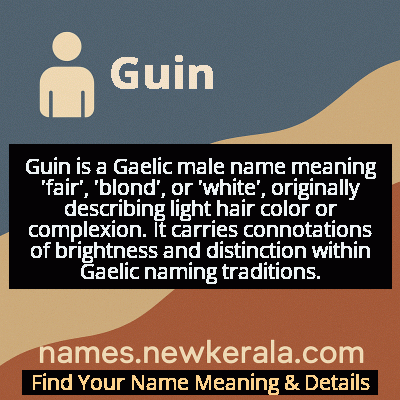Guin Name Meaning & Details
Origin, Popularity, Numerology Analysis & Name Meaning of Guin
Discover the origin, meaning, and cultural significance of the name GUIN. Delve into its historical roots and explore the lasting impact it has had on communities and traditions.
Name
Guin
Gender
Male
Origin
Gaelic
Lucky Number
6
Meaning of the Name - Guin
Guin is a Gaelic male name meaning 'fair', 'blond', or 'white', originally describing light hair color or complexion. It carries connotations of brightness and distinction within Gaelic naming traditions.
Guin - Complete Numerology Analysis
Your Numerology Number
Based on Pythagorean Numerology System
Ruling Planet
Venus
Positive Nature
Harmonious, responsible, caring, and artistic.
Negative Traits
Overly idealistic, superficial, possessive, or jealous.
Lucky Colours
Pink, turquoise.
Lucky Days
Friday.
Lucky Stones
Diamond, turquoise.
Harmony Numbers
2, 3, 9.
Best Suited Professions
Artists, musicians, teachers, healthcare workers.
What People Like About You
Warmth, nurturing nature, artistic flair.
Famous People Named Guin
Guin O'Brien
Irish chieftain
Leader of the O'Brien clan in County Clare, known for resisting English rule
Guin MacCarthy
Gaelic poet
Preserved traditional Irish poetry and oral histories during the Penal Laws period
Guin Fitzgerald
Revolutionary
United Defender leader in Wexford during the Irish Rebellion of 1798
Guin O'Malley
Mariner and trader
Maintained traditional Gaelic trade routes between Ireland and Spain
Name Variations & International Equivalents
Click on blue names to explore their detailed meanings. Gray names with will be available soon.
Cultural & Historical Significance
Extended Personality Analysis
Individuals named Guin are often perceived as possessing a calm, observant nature combined with unexpected resilience. They tend to be thoughtful and analytical, preferring to observe situations carefully before acting. This contemplative approach often makes them excellent problem-solvers who can see patterns and connections others might miss. Their fair-mindedness (reflecting the name's meaning) typically extends to their interactions with others, making them valued for their impartial judgment and ability to see multiple perspectives. Despite their quiet demeanor, Guins often demonstrate remarkable inner strength and determination when pursuing goals they believe in. They tend to be loyal to their principles and to those they care about, though this loyalty is earned rather than freely given. Their strength often lies in persistence rather than flashy displays, making them reliable in crises and steady in their commitments. Many Guins develop a strong sense of cultural or family identity, often showing interest in history, tradition, or preserving knowledge. They may appear reserved at first but reveal warmth and depth to those who take the time to know them properly. This combination of quiet observation and deep commitment makes them particularly effective in roles requiring patience, analysis, and steadfastness.
Modern Usage & Popularity
In contemporary times, Guin remains a relatively uncommon but meaningful choice, particularly among families with Irish or Scottish heritage seeking to honor their Gaelic roots. The name has maintained a steady but low profile in birth registries, often chosen by parents looking for traditional names that are distinctive without being overly exotic. Its usage has seen slight increases during Celtic cultural revivals and as part of the broader trend toward unique, heritage-based names. While not ranking in mainstream popularity charts, Guin enjoys particular favor in Irish-American and Scottish diaspora communities where it serves as a cultural marker. The name's simplicity and easy pronunciation in English-speaking countries contribute to its enduring appeal. Modern Guins often find their name sparks conversations about heritage and history, creating natural connections to Gaelic culture. The name continues to be used predominantly for boys, maintaining its traditional gender association while occasionally appearing as a unisex option in creative naming contexts.
Symbolic & Spiritual Meanings
Symbolically, Guin represents clarity, purity, and enlightenment - meanings that extend naturally from its association with light coloring. The fair hair or complexion referenced in the name's origin connects to broader symbolic traditions where light represents knowledge, truth, and moral purity across many cultures. In Celtic symbolism specifically, fair features were sometimes associated with otherworldly connections or divine favor, linking the name to spiritual awareness and higher understanding. Guin also carries connotations of rarity and distinction, as fair characteristics stood out in predominantly darker-haired Gaelic populations. This symbolic rarity translates to uniqueness of character and perspective in modern interpretations. The name suggests someone who brings light to dark situations, offers clear insight, or maintains purity of purpose amid complexity. Additionally, as a name that survived cultural suppression, Guin symbolizes resilience and the enduring power of cultural identity against external pressures and assimilation.

